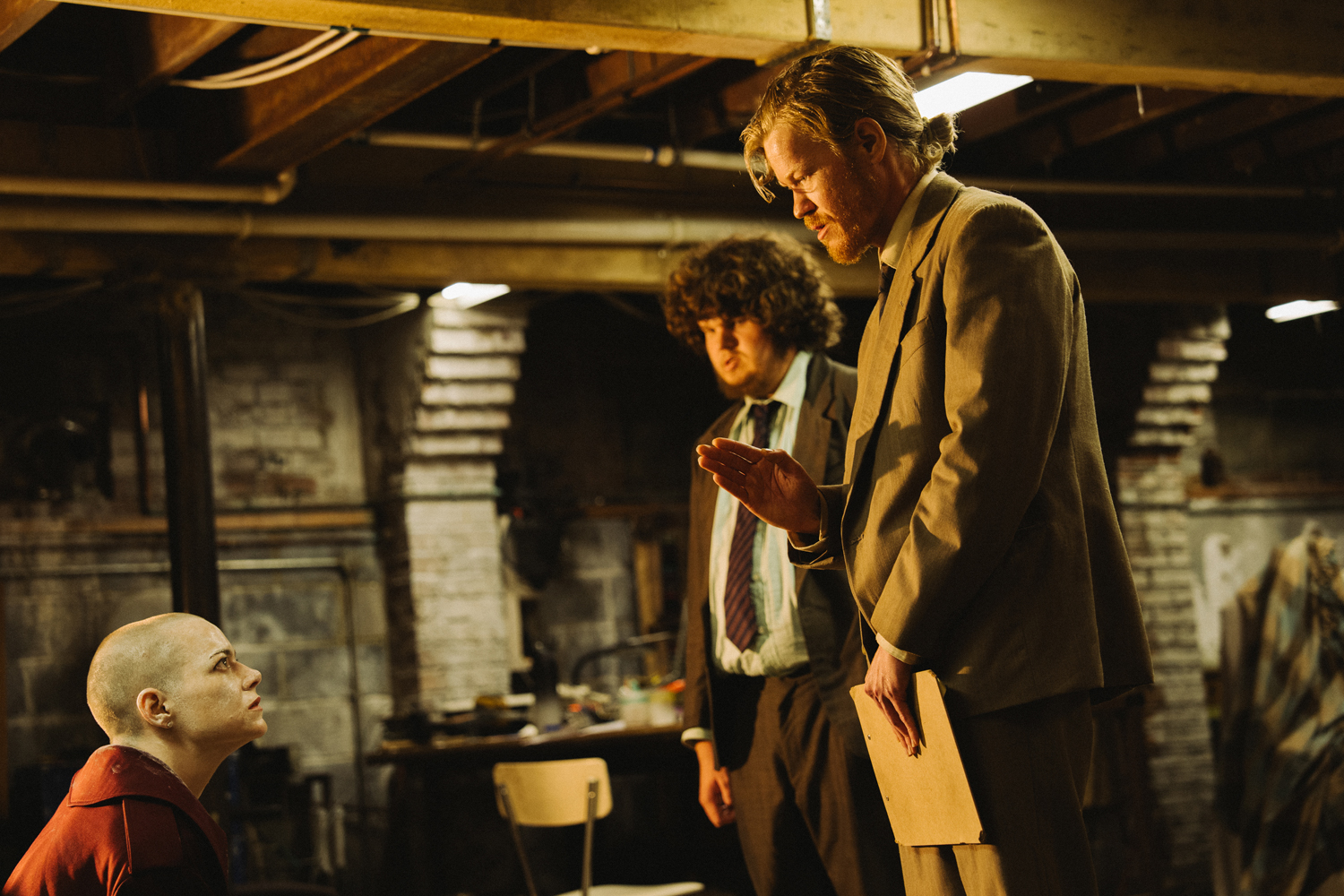
Emma Stone as Michelle Fuller, Aidan Delbis as Don and Jesse Plemons as Teddy Gatz in a scene from "Bugonia." (Photo by Atsushi Nishijima, courtesy of Focus Features)
Inspiration is hard to come by these days. It's as fleeting as a South Florida cold front. It's odd and a bit dispiriting to reach this point of the movie year to find a string of respectable awards-season hopefuls but few standouts. High-profile disappointments litter the landscape, dashing expectations and igniting hopes that as-yet unreleased festival favorites will deliver on their promise. No pressure.
Speaking of festivals, the 2025 Miami Film Festival GEMS is currently underway, bringing several dozen hotly anticipated titles to these shores ahead of their commercial rollouts. I've opted to sit it out this year, the better to focus my attention on current releases, such as the following quartet. Two of them are actually showing at GEMS this weekend, even though you may also catch them at a multiplex near you. All four come from well-respected directors with impressive bodies of work. Directors I like very much.
For those of you looking to take a break from this Halloween weekend's cooler temperatures by catching a movie, let's find out which of these four movies fire up the imagination, and which ones don't quite manage to rise to the occasion.
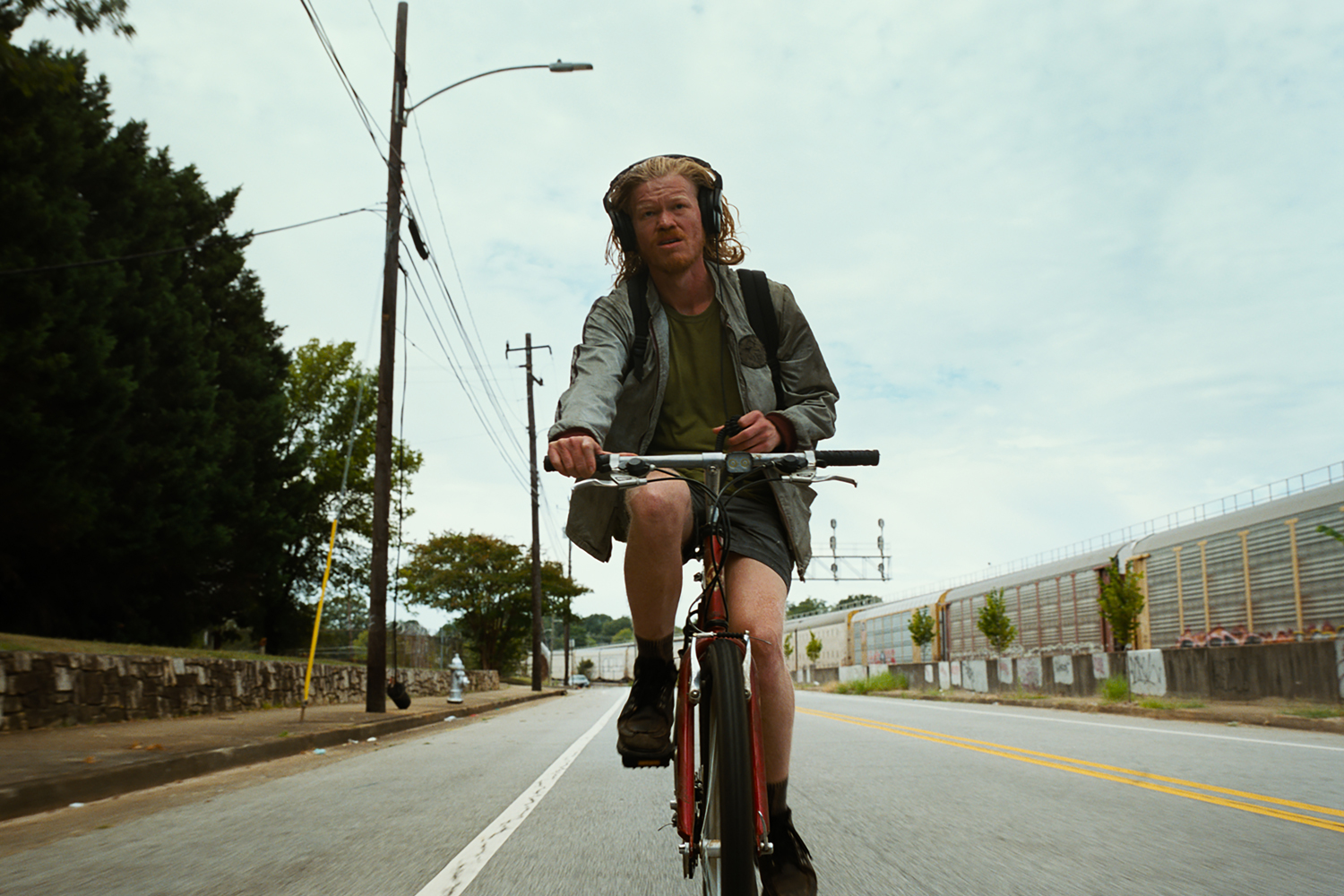
Jesse Plemons as Teddy Gatz in a scene from "Bugonia." (Photo courtesy of Focus Features)
“Bugonia”: She's tackled, abducted, tied up, interrogated and shorn of her hair until she looks uncannily like Gollum, but Michelle Fuller, the steely Big Pharma CEO at the center of this sci-fi-tinged dark comedy, stays cool and collected under pressure. She's a corporate titan with killer instincts, a good thing considering her bizarre predicament: One of her captors is convinced she's an alien, and not the benevolent kind.
The fourth collaboration between Emma Stone and filmmaker Yorgos Lanthimos is a stubborn mule of a movie, its saturated hues and boxy aspect ratio sucking us right into a battle of wills that gives the “Dogtooth” and “The Favourite” auteur a chance to throw some jabs at corporate culture, internet conspiracies and coronavirus paranoia. For several stretches, this remake of the South Korean film “Save the Green Planet!” plays like a COVID allegory that's reasonably potent, if a bit past its expiration date.
Working from a screenplay by Will Tracy (“The Menu”), Lanthimos mines considerable comic mileage from the clash of realities that sparks when disgruntled warehouse worker Teddy Gatz (Jesse Plemons) and Don (Aidan Delbis, bearing more than a passing resemblance to Vice President JD Vance), his neurodivergent cousin, kidnap Michelle right after she drives home in her shiny Mercedes G-Wagon and hold her captive in their basement, her face slathered with antihistamine cream because, Teddy asserts, it prevents her from contacting her mother ship.
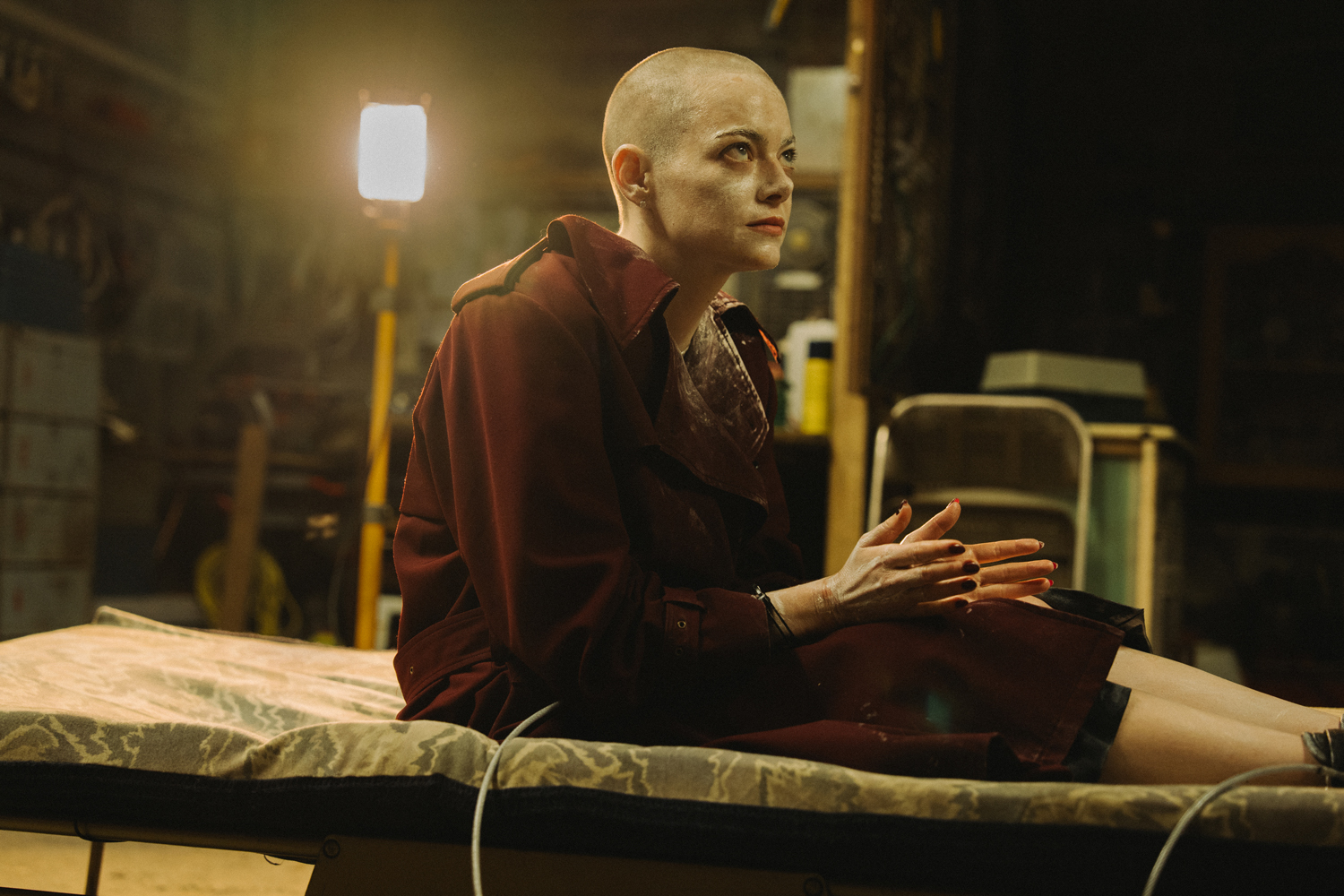
Emma Stone as Michelle Fuller in a scene from "Bugonia." (Photo by Atsushi Nishijima, courtesy of Focus Features)
The escalating face-off keeps you guessing as to whether the scruffy, scrawny Teddy has lost his marbles or whether his ravings about how Michelle is actually an “Andromedan” with intentions to pull the plug on humankind are right on target.
It all sounds like transgressive, irreverent, kooky fun, and the film's off-kilter energy goes a long way toward making the inherent silliness of its one-note premise easy to digest. The Focus Features release has so much going for it: a ferocious Stone, a committed Plemons (looking even slimmer than in “Kinds of Kindness,” last year's Lanthimos joint) and a nifty if a bit overbearing score by Jerskin Fendrix. Best of all is the eye-popping imagery by cinematographer Robbie Ryan, who shot the film in the suddenly trendy VistaVision format that Paul Thomas Anderson used to film “One Battle After Another.”
It's invigorating to see Lanthimos at work. His knack for finding just the right camera placement for his wide-angle tableaux is coupled with his tendency to push viewers' buttons while never losing his empathy for his characters. No matter how twisted Lanthimos' movies get, there's an underlying fondness that makes the misanthropy palatable and, in the best cases, quite tasty. (It's a balancing act that fellow provocateur Ari Aster, credited here as a producer, shows little interest in pursuing.)
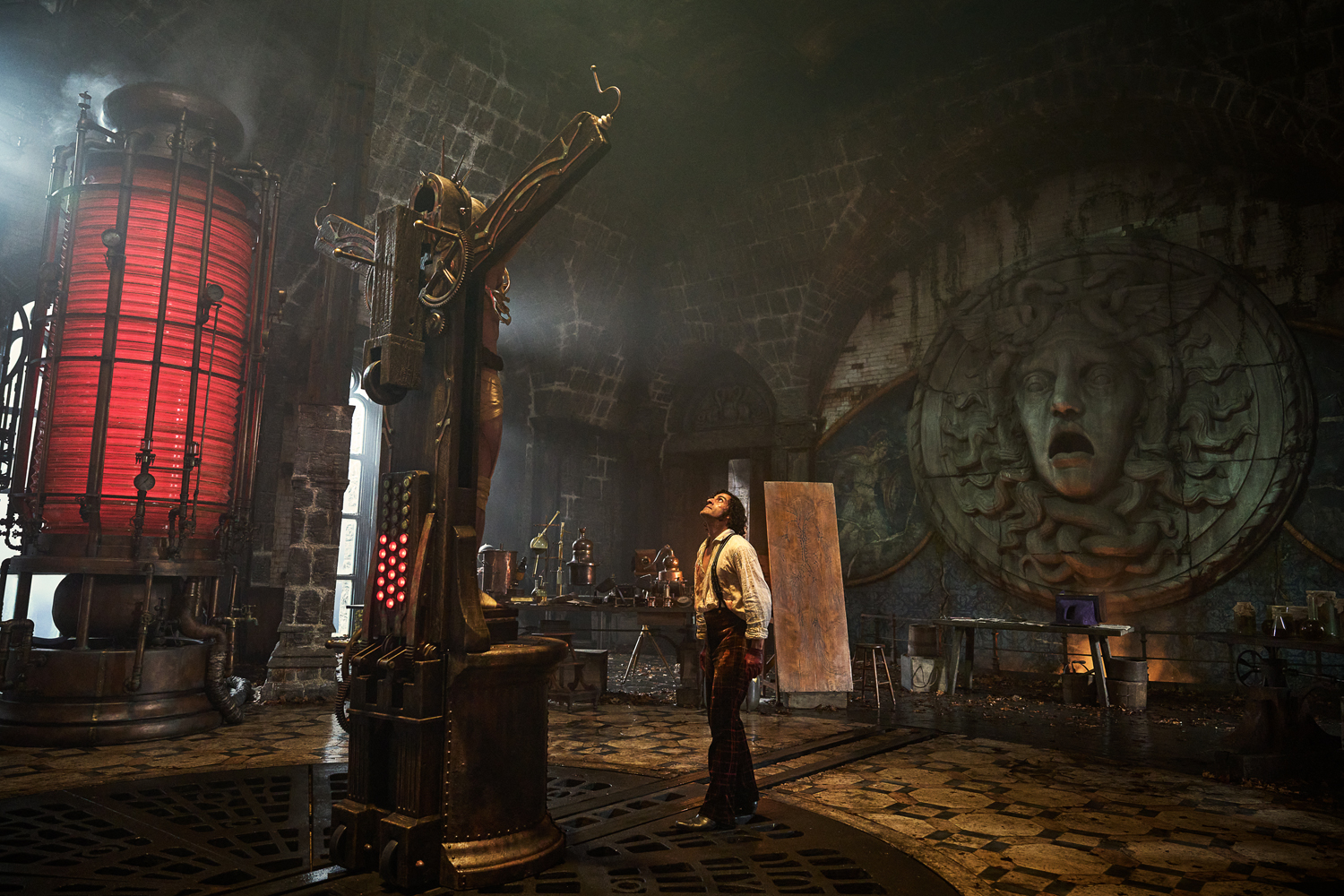
Oscar Isaac as Victor Frankenstein in a scene from "Frankenstein." (Photo by Ken Woroner, courtesy of Netflix)
But “Bugonia” is undermined at just about every turn by its half-baked, self-satisfied script. Tracy likes his satire smothered in “foregone conclusion” plotting. In “The Menu,” an eat-the-rich foodie comedy starring Ralph Fiennes and Anya Taylor-Joy, viewers spend half the movie waiting for the other shoe to drop. (Guess what: The other shoe does, in fact, drop.) The smarmy arrogance that gave me indigestion while sitting through “The Menu” makes its way to “Bugonia,” and it feels at odds with Lanthimos' playful creative impulses. Following an engrossing start, the film peters out in facile, frustrating ways.
In a recent interview, Lanthimos said he plans to take a break from making movies following back-to-back projects, and it's probably for the best. With “Bugonia,” a well-crafted letdown, that winning streak comes to an end.
“Frankenstein”: A couple of years ago, Lanthimos and Stone teamed up to make “Poor Things,” a gleefully sex-positive variation on themes novelist Mary Shelley explored in “Frankenstein, or, The Modern Prometheus.” Guillermo del Toro has long wanted to give the oft-adapted 1818 novel his own Gothic-flavored imprint. It's a good thing he's scratched that itch, because now he can move on to material bereft of the cumbersome baggage.
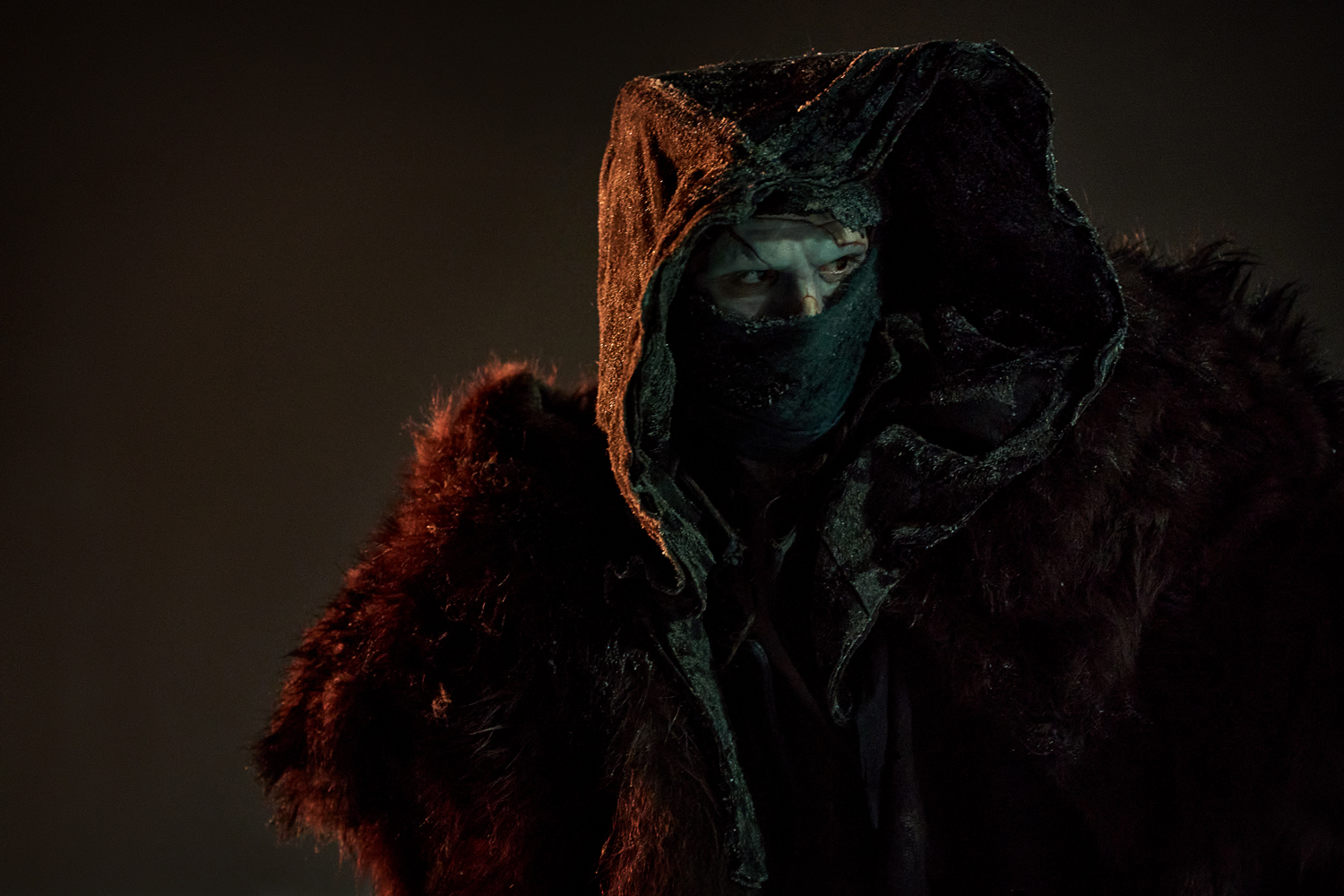
Jacob Elordi as The Creature in a scene from "Frankenstein." (Photo by Ken Woroner, courtesy of Netflix)
The wildly uneven science experiment that the “Pan's Labyrinth” auteur has cooked up is a tale of dueling sensibilities, neatly represented by the opposing approaches of its two central performances.
In one corner, there's Oscar Isaac, whose Dr. Victor Frankenstein is an overgrown brat with daddy issues. (Literally. Charles Dance, in the Christopher Lee role, plays the elder Frankenstein in flashbacks.) Star Wars' Poe Dameron sees no need to hold back. Like many a Victor before him, the character's virtuosic skills with a scalpel are dwarfed by his blinding quest to play God and his gift for destroying everything and everyone he touches. But the “Card Counter” star goes full-ham Byronic, doubling down on Victor's jerkitude. It's a liberating choice that's a welcome respite from the film's stifling costume drama trappings.
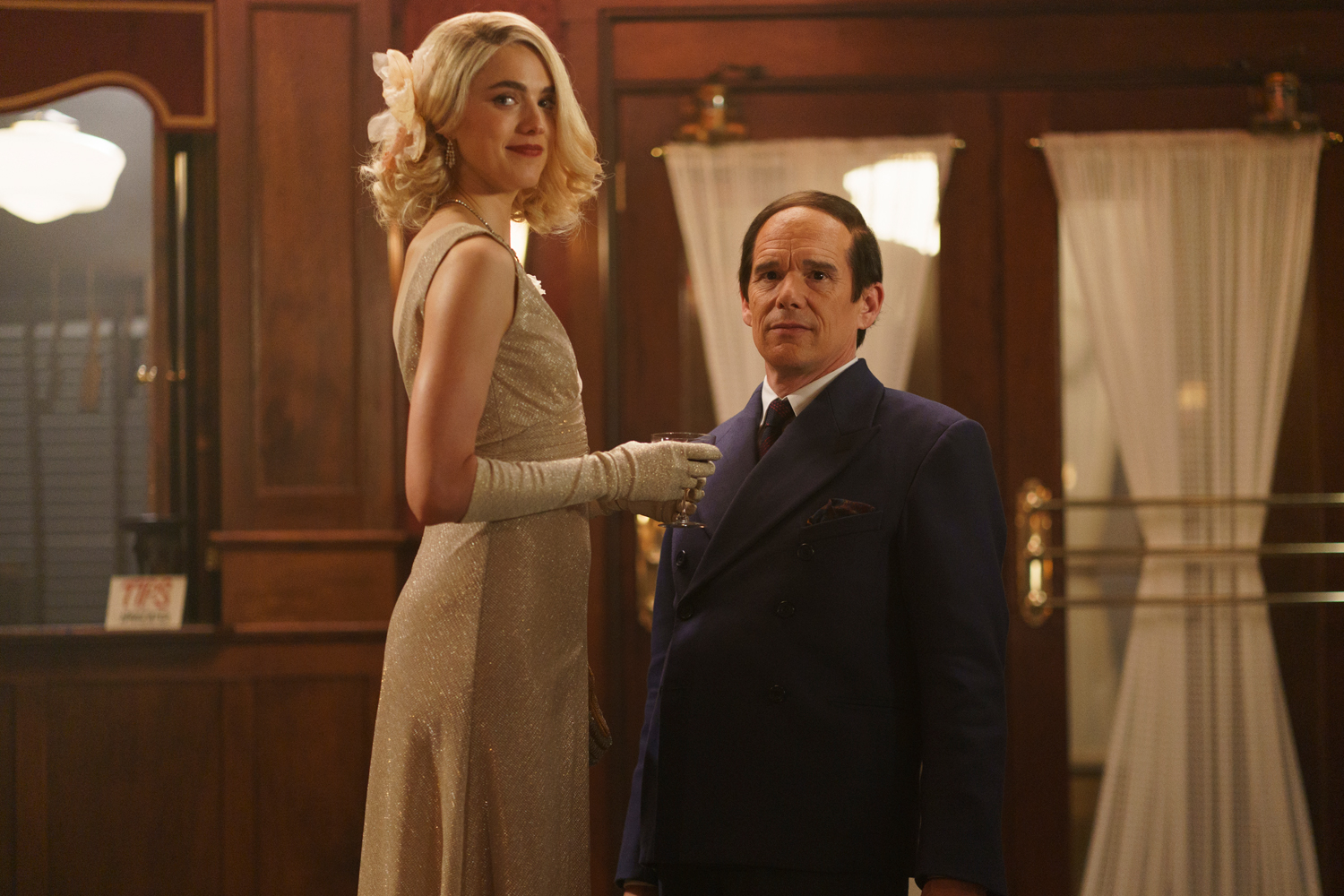
Ethan Hawke as Lorenz Hart and Margaret Qualley as Elizabeth Weiland in a scene from "Blue Moon." (Photo by Sabrina Lantos, courtesy of Sony Pictures Classics)
Then there's Jacob Elordi, who opts to play Victor's reanimated creation as a tortured soul. This mopey descendant of Boris Karloff's block-headed Universal screen icon is a walking open wound, the pain of existence contained in a gray, scarred, hulking frame that comes across as a high-toned variation on Edward Scissorhands, only with superhuman strength in place of steel shears. In this incarnation, the undead-adjacent character, referred to as “The Creature” by del Toro, is a misunderstood loner. He is most definitely Not A Monster.
So we have Isaac's over-the-top theatrics on one hand, Elordi's inclination to turn his portrayal into a Shakespeare tragedy, complete with brooding soliloquies, on the other. The tonal disparity keeps things interesting; you can't call this “Frankenstein” boring. But the movie is weighed down by its warring impulses. Its fidelity to the text, for instance, is admirable but counterproductive. Like Kenneth Branagh in “Mary Shelley's Frankenstein” (1994), del Toro restores the book's frigid, nautical framing device, but those scenes are not particularly well executed, plus they make the film feel longer. It hardly merits the two-and-a-half-hour running time.
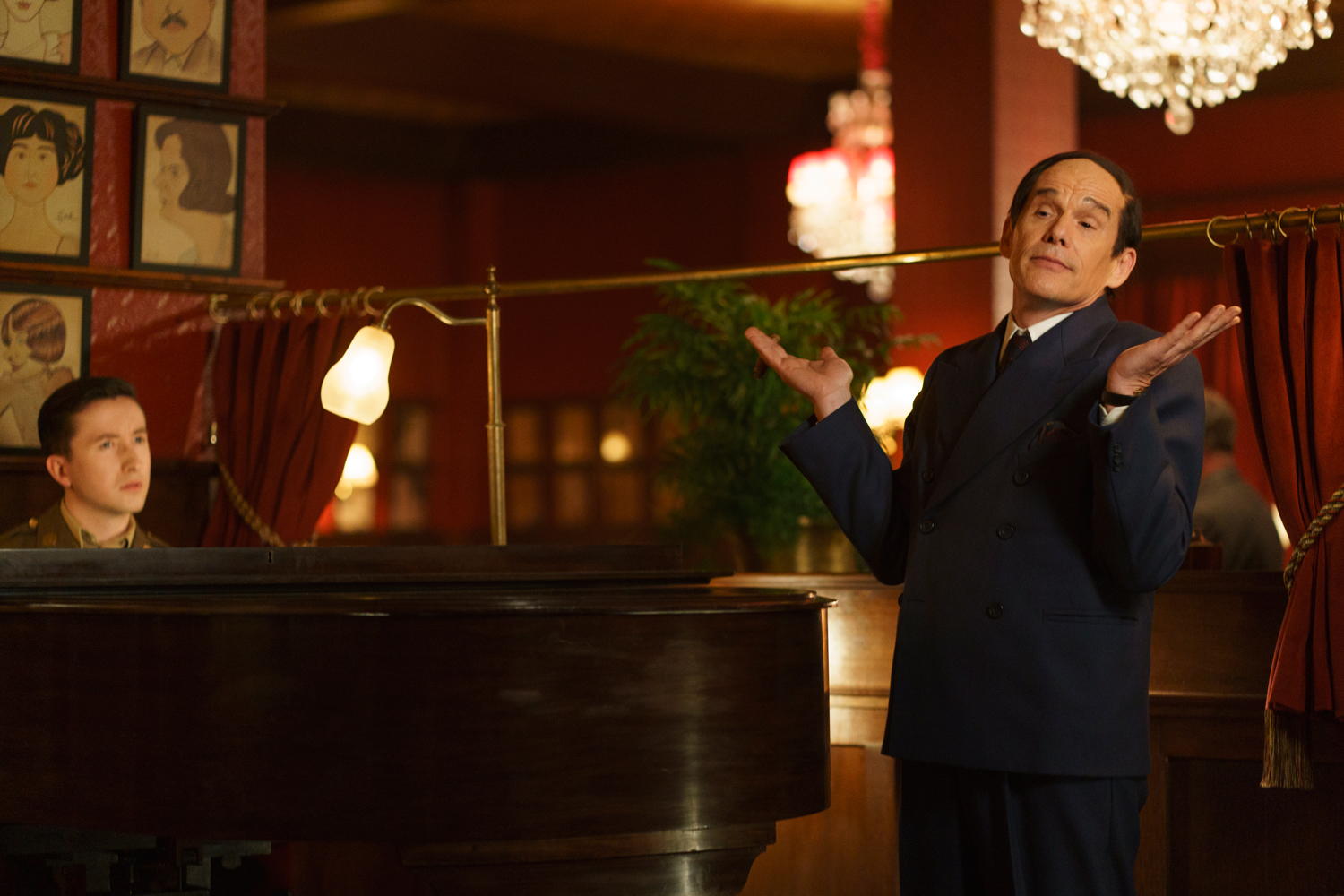
Jonah Lees as Morty Rifkin and Ethan Hawke as Lorenz Hart in a scene from "Blue Moon." (Photo by Sabrina Lantos, courtesy of Sony Pictures Classics)
At the same time, some of the changes del Toro makes to move the story along don't do the movie any favors. They feel hacky and cheap, despite the sumptuous production values on display, making this Netflix production feel like a limited series, heavy on the melodrama, condensed into feature length.
But what's even more confounding is that del Toro is hellbent on turning his “Frankenstein” into cinema of quality, a strategy that also marred his remake of “Nightmare Alley.” Of his filmography, the previous effort it most resembles is “Crimson Peak,” his woefully underappreciated haunted mansion romance. The difference is that in the earlier film, the director was able to fuse the material's period piece elements with the startling bloodletting of an Italian giallo. As his unwieldy “Frankenstein” progresses, del Toro leeches it of pulp, until what's left is awards-season fodder that downplays the mayhem. If ever there was a case of a horror movie being in dire need to be trashier and more unhinged, you're looking at del Toro's Exhibit A. Still, Isaac's fun to watch.
“Blue Moon”: You know who else is having fun? Ethan Hawke. The actor and filmmaker tears into his portrayal of legendary Broadway lyricist Lorenz Hart with take-no-prisoners gusto. That said, social media chatter stating that the “Training Day” and “Before Sunrise” star disappears into the role is hyperbolic. That doesn't quite happen, at least not at first.
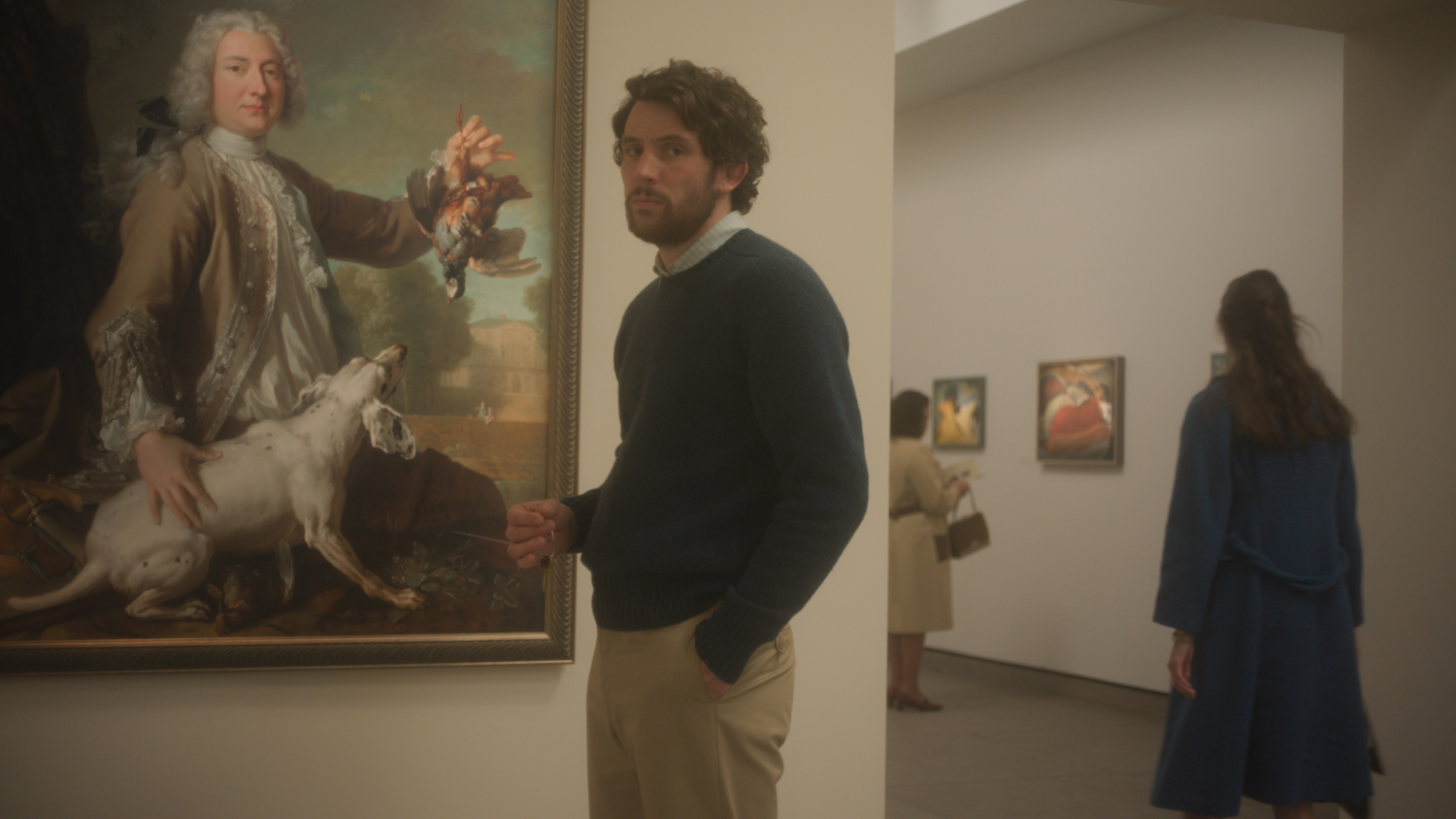
Josh O'Connor as James Blaine "J.B." Mooney in a scene from "The Mastermind." (Photo courtesy of MUBI)
The ninth collaboration between Hawke and his “Before Trilogy” and “Boyhood” director Richard Linklater ticks several boxes that tend to turn me off about prestige biopics. Most prominently, it showcases that rustiest of awards-season gambits: a respected cishet actor flexing his muscles by playing gay, or as Hart would insist, finding beauty in men and women. What industry pundits called daring once upon a time comes across here as stale at first glance.
But the screenplay, by novelist Robert Kaplow, does two things that work mostly in the film's favor: It limits its portrait to one very eventful night in musical theater history, and for almost all of its running time, it contains the action to one location. Linklater, no stranger to single-setting movies (see also: “Tape”), takes what could have been drawbacks and turns them into virtues.
The date is March 31, 1943. Hart sits next his mother, mortified by the corny earnestness of “Oklahoma!” It's opening night for what would become a Broadway juggernaut. It is also the first collaboration between composer Richard Rodgers (Andrew Scott), his creative partner of two decades, and lyricist Oscar Hammerstein II (Simon Delaney), a new partnership that would also yield a little musical called “The Sound of Music.”
A diminutive man in his late 40s with the gift of gab and a bad combover, Hart saunters over to Sardi's restaurant across the street to vent. His audience: bartender Eddie (Bobby Cannavale), pianist/aspiring composer Morty Rifkin (Jonah Lees) and, for a little while, author E.B. White (Patrick Kennedy). Idle chatter about the gay subtext in “Casablanca” gives way to more existential matters, as well as to Hart's trepidation about meeting Elizabeth Weiland (Margaret Qualley), an art student at Yale who's 27 years his junior and with whom he says he made a connection, one that's more unrequited and less reciprocal than he lets on.
Kaplow divides his screenplay evenly between Hart's time in Sardi's before the show across the street ends and the awkward encounters that arise when attendees make their way to the restaurant to celebrate and wait for the reviews. Linklater is not completely immune to the stagy nature of Kaplow's dialogue, but he finds a way to make Sardi's feel dynamic, preventing “Blue Moon” from feeling too static. He is less successful in his visual trickery to make Hawke seem shorter, a well-intentioned attempt to approximate his subject's short stature that just ends up calling attention to itself.
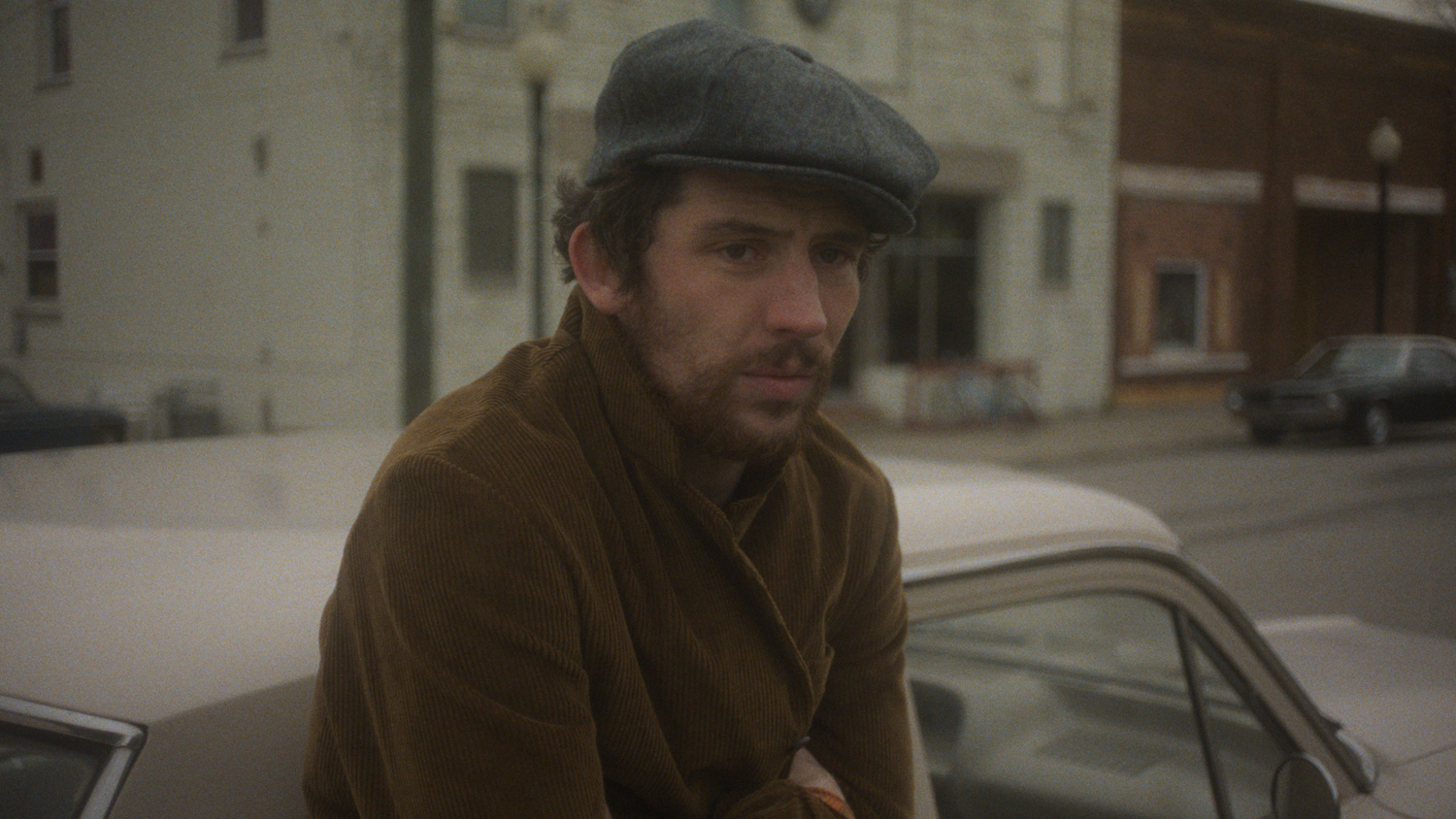
Josh O'Connor as James Blaine "J.B." Mooney in a scene from "The Mastermind." (Photo courtesy of MUBI)
But when Hawke takes center stage, my issues with “Blue Moon,” that it's hermetic, overly wordy and, well, intrinsically hetero, don't matter as much. The star rises to the Herculean challenge, finding pathos in Hart's struggles with heavy drinking and depression, as well as in his realization that he is now yesterday's news, a dinosaur whose demons wreak havoc on his professional and personal connections.
A climactic heart-to-heart with Weiland, during which Hart's desperation hits a boiling point, achieves what the hype machine claims, and Hawke, his face filled with despair and fear, finally disappears into the role. This may be a straight filmmaker's depiction of a pioneering “omnisexual” figure, and one wonders whether this could have been a more raw and devastating portrait if a queer filmmaker were calling the shots, but I can't stay mad at Linklater. Because he gives a damn about Hart and this transitional moment in American theater, he makes it easy for us to do the same.
“The Mastermind”: He looks at the paintings hanging on the walls, but he is the work of art under scrutiny. How fortunate for him that it's Kelly Reichardt doing the observing. The “First Cow” and “Meek's Cutoff” director has made another of her spartan character studies, modest only in size and scope, and it greatly benefits from featuring one of this year's subtlest, most accomplished performances.
The year is 1970, and James Blaine “J.B.” Mooney is checking out the Framingham Museum of Art with his wife Terri (Alana Haim) and their two young sons. His loved ones don't know it yet, but J.B. is casing the joint. The plan for this fictitious character, a ne'er-do-well who aspired to be an architect but is currently an unemployed carpenter in Nixon's America, is to steal four abstract paintings by the very real Arthur Dove. After all, security at this place is lax.
Oh, J.B. A scowl on his face, taciturn in temperament and, in his own head, a brilliant criminal mind who's about to get away with the kind of theft that just doesn't happen in this suburban city west of Boston. The mood is autumnal, and the laughs are wry. Because, you see, J.B. is quite bad at breaking the law. It probably doesn't help that he grew up as the son of a local judge (the ubiquitous Bill Camp).
The obstacles that prevent J.B.'s scheme from going smoothly come early, starting with his mother (Hope Davis), who is skeptical when he asks her to lend him money, and his accomplices, who are not as experienced or as reliable as he'd hoped. As Reichardt chronicles the planning of the heist, the actual heist and its messy aftermath, the setbacks don't let up.
But the filmmaker is less interested in the caper aspect of her narrative, more so in what makes its titular architect's head tick. She finds in O'Connor an actor finely attuned to her low-key approach to this tale of malfeasance most inept. The star refuses to make J.B. a sympathetic figure, and that makes him all the more fascinating. His performance is a master class, a career high for the “Challengers” and “God's Own Country” star.
The reality checks don't just come for our hapless protagonist. Audiences expecting “The Mastermind” to be a tense heist movie might be surprised to learn it isn't much of a heist movie at all. Like many of Reichardt's film, it's poky and serene, but the stillness of her mise en scene draws you in if you can acclimate to its wavelength.
During its back end, the film morphs into a road movie of sorts that gives Reichardt a chance to show us more sides of the country. What emerges is a vividly rendered snapshot of the uncertainty and unease at this moment in time, anchored by O'Connor tightly controlled portrait of a gradually unraveling J.B. There are also echoes of “Wendy and Lucy,” Reichardt's tender tale of a woman on society's margins, hardened by life's knocks, and her beloved dog.
“The Mastermind” ends in an exquisite irony that uses the social unrest of the period to teach a hard lesson. There are no easy answers here, no pat resolutions and certainly no Pop Psych 101 explanations, just perceptive, skillfully realized moviemaking that reshapes what begins as a crime comedy into something more poignant and melancholy. It's quite special, enough to give me a little hope that the remainder of this movie year won't be as bad as J.B. is at stealing stuff.
“Bugonia” is now showing across South Florida in wide release, including at Silverspot Cinema in downtown Miami, CMX Brickell City Centre, AMC Sunset Place, Regal Dania Pointe and Paradigm Cinemas: Gateway Fort Lauderdale.
“Frankenstein” is showing at O Cinema South Beach, CMX Dolphin, Cinépolis Luxury Cinemas Coconut Grove and the Silverspot in Miami. It is also showing Friday night at Coral Gables Art Cinema as part of GEMS, and it starts streaming on Netflix on Nov. 7.
“Blue Moon” is showing at AMC Aventura, AMC Sunset Place, Gateway Fort Lauderdale and AMC Pompano Beach. It is also showing Sunday afternoon at the Silverspot in Miami as part of GEMS.
You'd better hurry if you want to catch “The Mastermind,” which is playing at AMC Aventura through Wednesday.




